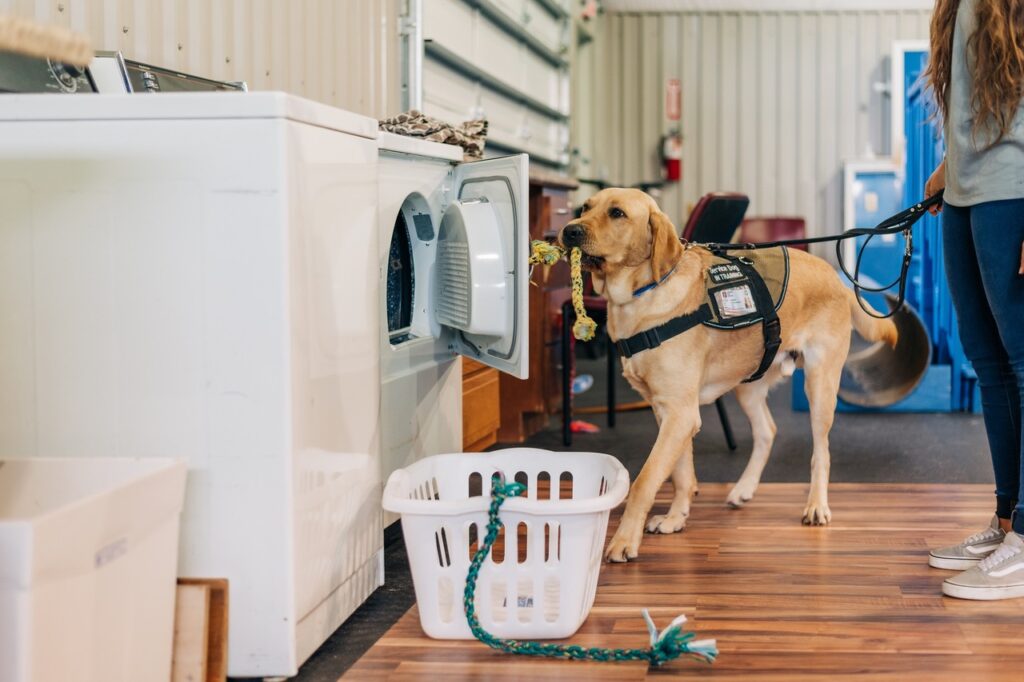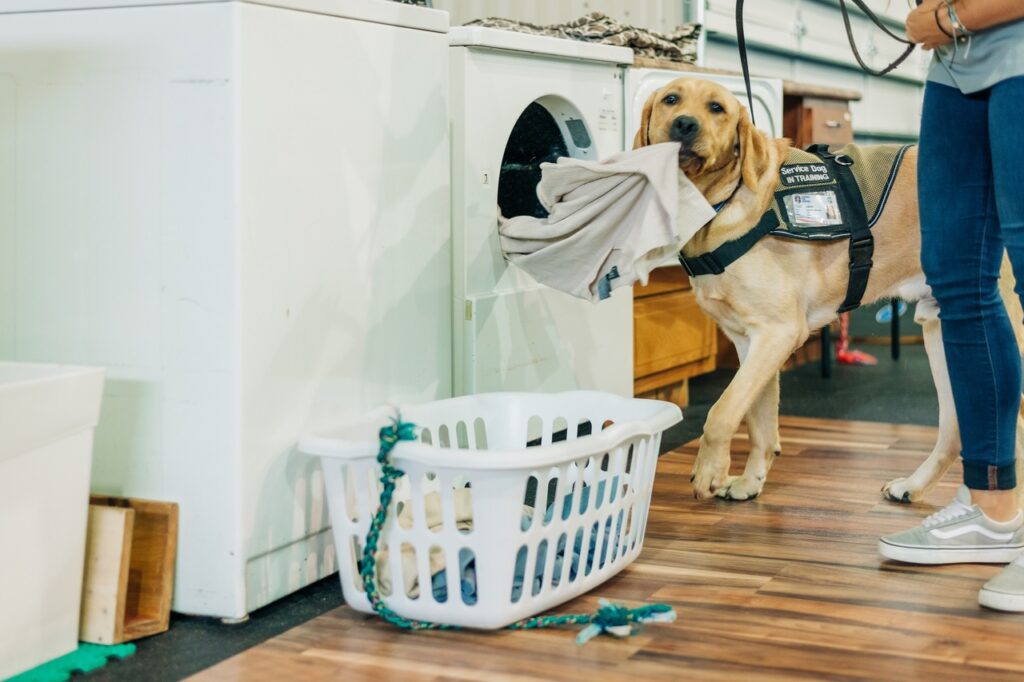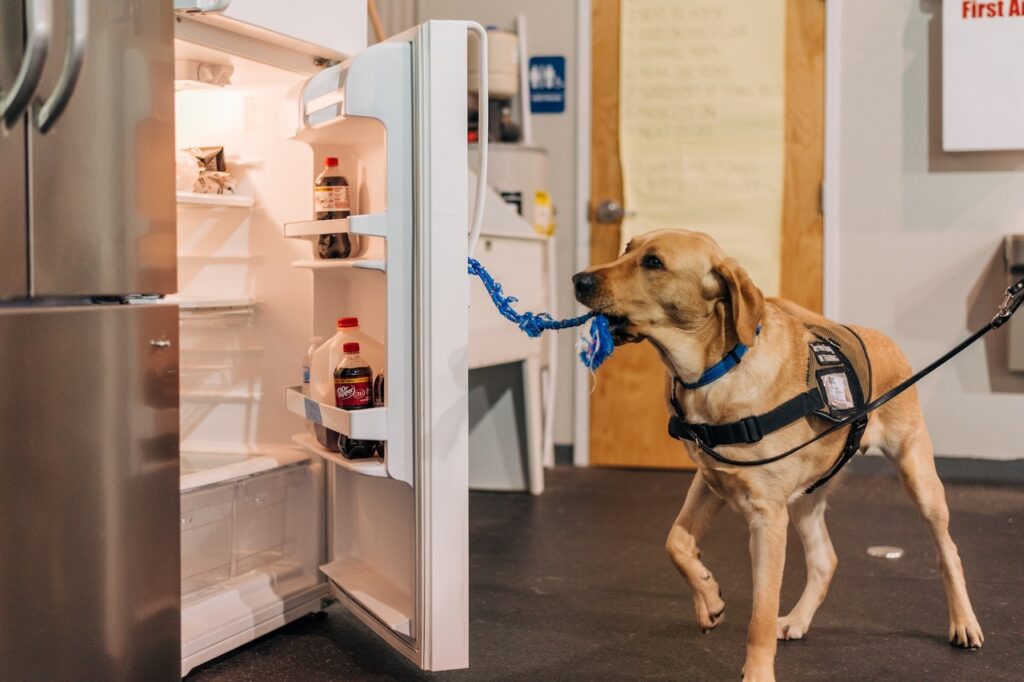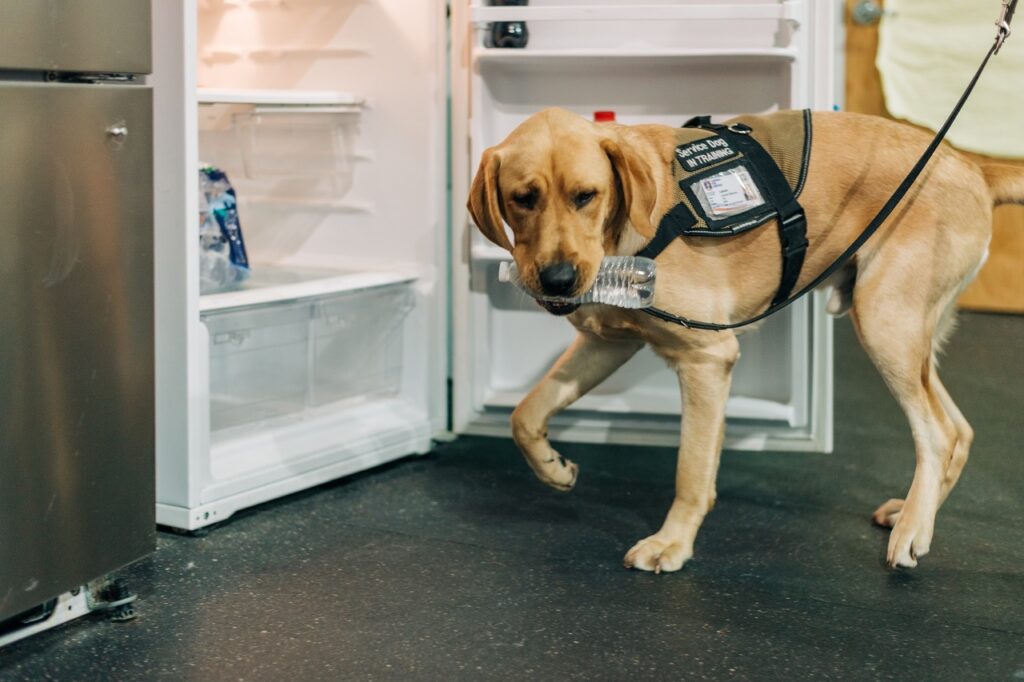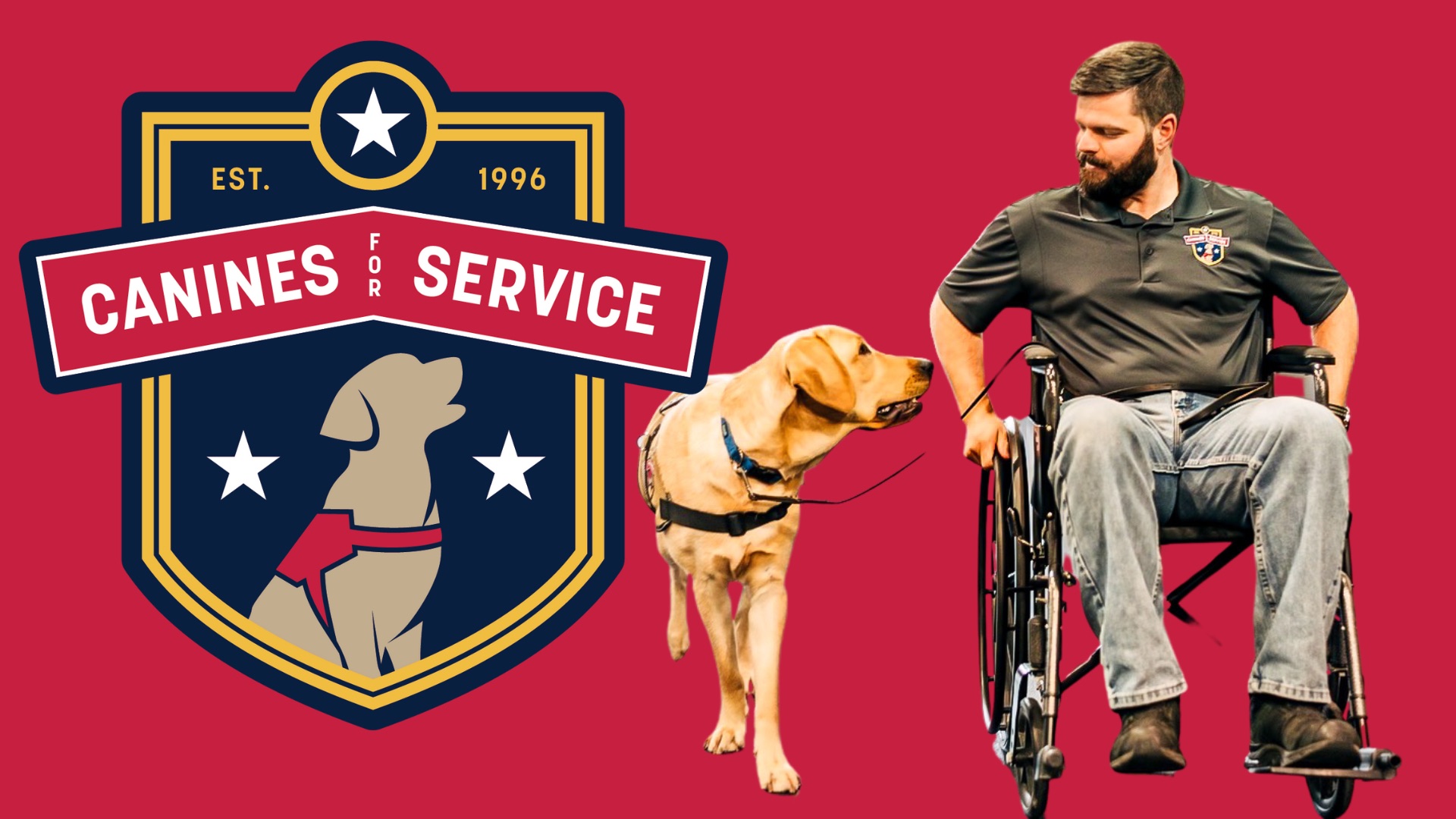
Semper Fido
Hundreds of thousands of American veterans suffer from conditions leaving them in need of daily assistance. The always faithful service dogs of North Carolina’s Canines for Service are coming to the vets’ rescue.
Being raised in the South conditioned me to expect surprise. Whether tucked among the folds of rolling pastures, in the green creases of the Appalachian chain, or in coastal rivers and creeks made new by ever changing tides, our topography is such that things may be thrust upon us, sometimes delightful, sometime repellent, but always surprising. The dichotomy is our simultaneous blessing and burden. I choose to look for the blessings. Recently, I found one.
I was seeking somewhere to donate pet supplies when I walked through the door of Canines for Service (CFS) in Wilmington, North Carolina, for the first time. I am a retired U.S. Marine with a Labrador retriever fixation, so the word “service” in the name and the sign shaped like a military patch bearing the silhouette of a Lab flanked by stars caught my eye. Three minutes after I walked in and met Administrative Coordinator Kinsey Hanson, I was lying on the floor of the front office, playing with an excited yellow Lab pup. Ten minutes later I was on an impromptu tour of the facility. Surprise.
~~~
Canines for Service is a 501(c)3 nonprofit, Platinum-rated Guidestar program funded through donations. CFS provides service dogs, at no cost, to military veterans of all (or no) conflicts and all branches. The dogs help vets with service-connected mobility challenges, post-traumatic stress disorder, traumatic brain injury and/or military sexual trauma. It’s a huge population. Post-traumatic stress disorder (PTSD) rates run between 11 and 30 percent among millions of Vietnam, Desert Shield/Storm and post-9/11 war veterans. At least 185,000 veterans in the Department of Veterans Affairs' care have suffered at least one traumatic brain injury (TBI). A stunning 25 percent of female and 10 percent of male veterans under VA care report military sexual trauma (MST), often compounded by the preceding issues. Any or all of those issues may lead vets to physical or mental isolation, one of the chief causes of veteran suicide. Veterans Affairs says veterans are killing themselves at a rate increased by 35.9 percent since 2001. A service dog can quite literally be a life saver.
~~~
Belinda retired from the Air Force in 1999 and now lives in Charlotte, North Carolina. Though she had a full career, supporting operations to rescue hostages in Iran, providing humanitarian relief in Somalia, and supporting displaced Kurds in northern Iraq, it isn’t enough to reflect upon the good she did when so much was taken from her in the process. Belinda falls within the 25 percent of veteran women who suffered military sexual trauma during their service, an experience that left her unable to form longstanding relationships. The mental impacts, and the foot and back injuries she sustained during 20 years working in military warehouses, left her, she says, “in chronic pain all the time. And then, I'm depressed because I'm by myself, but then I can't deal with people.”
"He kind of saved my life. He has given me my life back because now he is like my best friend. He needs me, and I need him, so we’re a good match.”
Dogs had always been a refuge for Belinda, even as a child. When she lost a beloved pet, she became more depressed. Her VA doctor said, “I know you want to get an animal, but why don’t you get one that can help you?” Belinda thought the idea of a dog she could take everywhere was wonderful, but the practical reality of getting a service dog proved less so. By 2019, she had been waiting for more than a year for a dog from a Florida-based service dog organization when “the Sheriff's department down there called me and said they had my file and knew I was waiting for a dog, but the organization was under investigation,” she says. “So that was a waste of my time.” Then she found Canines for Service in Wilmington, just four hours away from Charlotte. She filled out the application and made a video with her VA doctor’s help. Now she lives with a two-year-old Golden Retriever named Pilot.
Pilot knows 77 commands. He helps Belinda with both her mobility and mental health. As she says, “Because I was limping for so long, I injured my back. The doctors really want me to walk, so he helps me with that. He's like 80 pounds. And so, if I'm down on the ground, I can tell him, ‘Brace,’ and I can hold onto him and he can pull me up.” Belinda credits Pilot with helping her anxiety, too.
“I have problems with being out,” she says. “He will go between me and other people. If I have an anxiety attack, he'll come to me and hug me, and so that'll distract me and calm me.”
The truth is, we all need to be needed. Belinda worked for four years after she retired till her injuries made that impossible. Eventually she realized that life was going on around her while she sat in a chair in her apartment. With Pilot, she says, “he'll motivate me — like, ‘Okay, let's go out and enjoy the outside.’ So I'll go out. He motivates me to get up and do things. And then, he also has helped me because I've always had a fear of being out and people being around me. So he helps. He listens, and like I said, I need something to kind of keep my mind from worrying because my mind goes all over the place. So, just brushing him, or doing things like that really is a good therapy for me. He gives me some type of responsibility. I probably could do some things that he does, but it's just that I can't imagine my life without him. And he kind of saved my life. He has given me my life back because now he is like my best friend. He needs me and I need him, so we’re a good match.” Asked where she would be without Pilot, Belinda is quick with a response, “Oh, six feet under.”
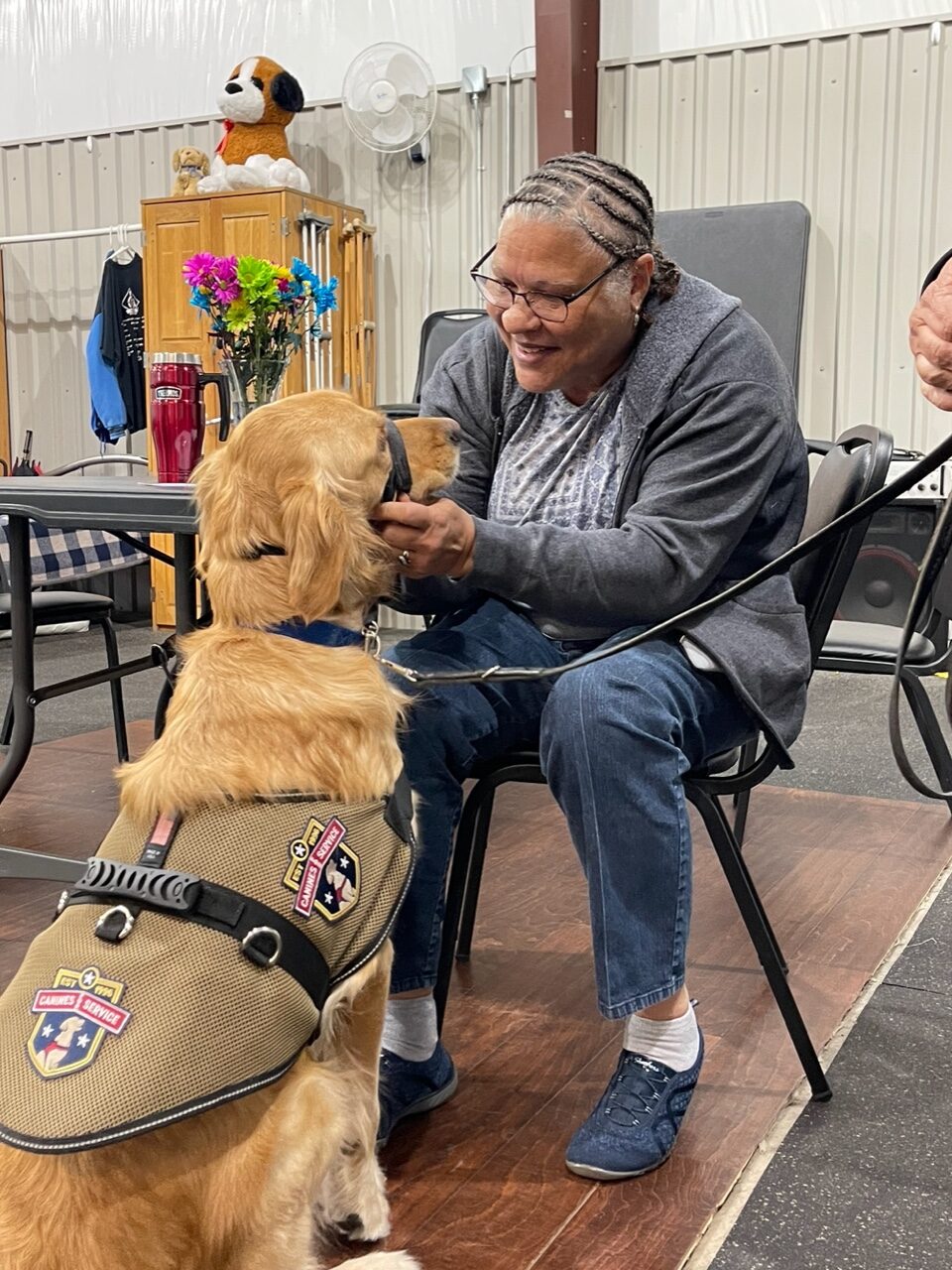
As you pass through the two buildings housing CFS, you meet people who look happy to be where they are. Talking to CFS staff like Director of Canine Operations Patrick Nee, himself a Marine veteran as well as a retired New York City Police K9 Officer, Training Programs Manager David McConnell, and Executive Director Bethany Leighton, you realize that people at CFS have differing reasons for being there but that all of them are motivated by stories like Belinda’s. You feel, and hear a lot about, love at CFS.
“My favorite and most rewarding aspect is when the dogs are actually meeting their client for the first time and the realization that all the hard work and dedication that I put into the dogs are completely worth the love from their clients,” one trainer says. “Knowing they are finally ready to be placed and have overcome any struggles through their training process is what I love.”
It's not only at the CFS headquarters or in the homes of people receiving service dogs that the effects of a dog’s love may be felt. True to form, CFS surprises by being the only service dog organization collaborating with the Marine Corps to house trainee service dogs with inmates at the Regional Brig, a military prison at Camp Lejeune in Jacksonville, North Carolina. By raising a service dog to help another vet, military prisoners get a chance to develop a skill while doing something good. They get the satisfaction of helping another human. It’s a chance to love something, a reminder that we are all interconnected, and an acknowledgement that we are all humans deserving of love.
As another trainer says, “The most rewarding part of this program is the opportunity I get to see just how much impact these dogs have on the lives of their handlers. From the puppy raisers who show them the world, to the military prison inmates who learn to train, to the client whose life is forever changed.”
For a lot of the dogs, life as a service dog is a second chance, too. Many of them come from area rescues, shelters, through donations, and from membership in the Assistance Dogs International ABC Breeding Cooperative Program.
“The most rewarding part of this program is the opportunity I get to see just how much impact these dogs have on the lives of their handlers. From the puppy raisers who show them the world, to the military prison inmates who learn to train, to the client whose life is forever changed.”
Between the inmate trainers and the professionals at CFS, service dogs learn a host of skills. Retrieving dropped/distant objects, pulling wheelchairs, opening doors, carrying items, rising to high counters, physically supporting veterans for mobility, physical assistance recovering from a fall, dressing or undressing, loading a washing machine, unloading a dryer, creating space in a crowd, turning light switches on and off, waking from night terrors, assistance during a panic attack, and easing feelings of isolation are just some of the vital skills they learn to provide during a training program that takes an average of 15 months and totals roughly 2,000 hours of training. Not all dogs complete the program. True to CFS spirit, those dogs not fully suited for life as a service dog still find a place and purpose through a "career change" and placement with community organizations such as a sheriff's department, at veterans homes, or as a pet for a veteran for whom companionship is enough. At CFS, no one is unworthy of love.
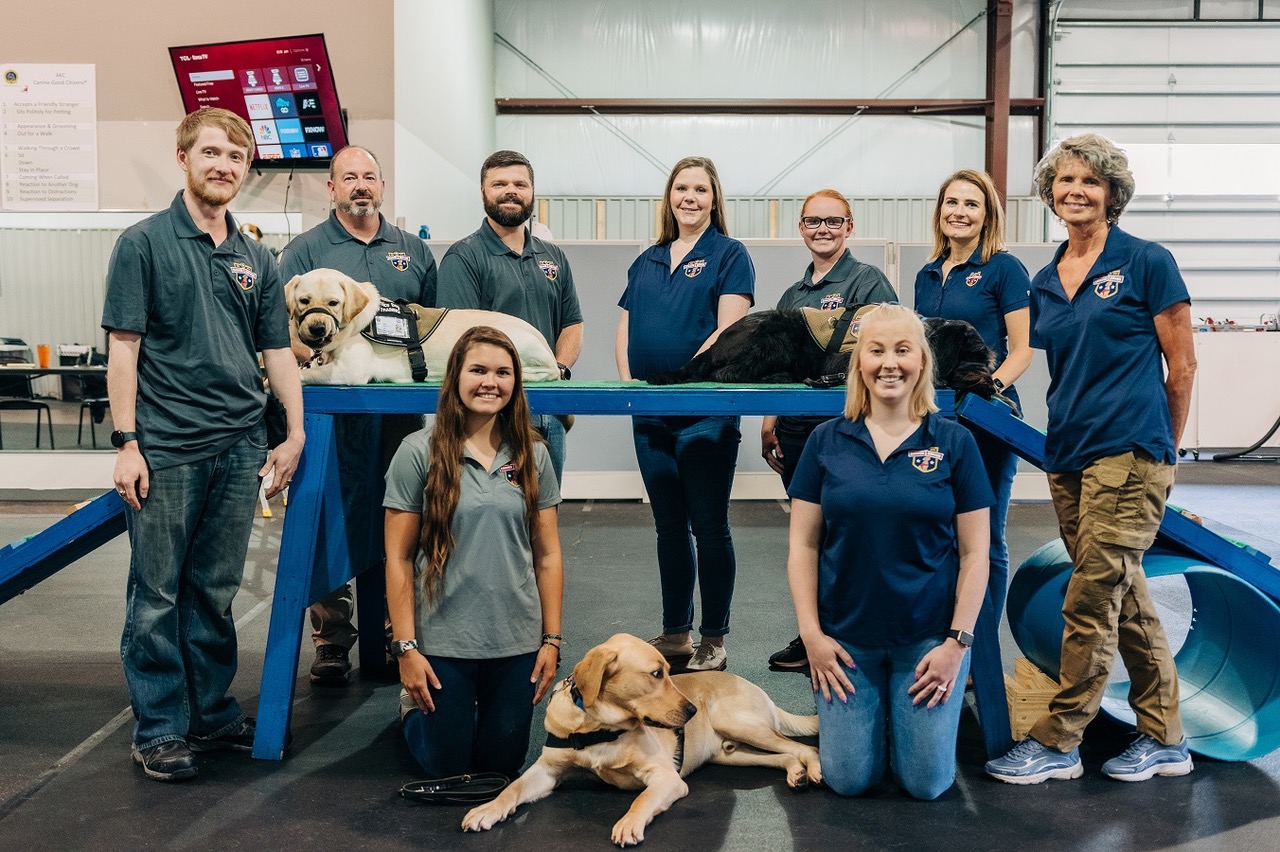
Leila lives in Virginia. She joined the U.S. Navy as a Mess Specialist in 1989. She began by cooking for sailors but earned degrees in Culinary Art and Hotel Management during her 20-year career. She loved the foreign travel, the cultures she encountered, and helping out in crisis situations, like Hurricane Katrina, as a crew member on the USS Harry S. Truman. But five years before she retired, she began to get crippling migraines that put her in hospital emergency rooms. Then she began dropping things. Then the falling started, causing injuries to her head and leg. Just before she retired in 2009, an officer she worked for, whose wife had multiple sclerosis, figured out what doctors had missed. Leila remembers him saying, “You have a problem. There's something going on, you need to find a neurologist.” It was indeed MS, and it was getting worse.
With a diagnosis came medication.
“That was really no fun,” Leila says. “It was once a week. It was a weekly injection, and it's awful. It’s just awful. You take this shot and it's like having the flu. A lot of times I just stay in bed because it's just awful; it really is. But the thing of it is, if you don't do it, then it progresses more. Damned if you do it, damned if you don’t.”
Then came a day when Leila the animal lover “had gotten a kitten, and I was holding it in my arms. And all of a sudden, my hands just went dead. And the kitten fell. Nothing happened, but it's just the point I said, ‘I can't do this by myself. I need some kind of help.’ Leila and her husband found Canines for Service and, she says, “they gave me hope. They gave me independence. They gave me courage. And they gave me faith that it will always get better. At that point, I was using a cane to get around, and sometimes it was just so bad, all I wanted to do is sit in a chair because I was afraid of walking and falling down and hitting my head. I was going right to a wheelchair.” Then came a Walker Hound-Labrador mix named Ezra.
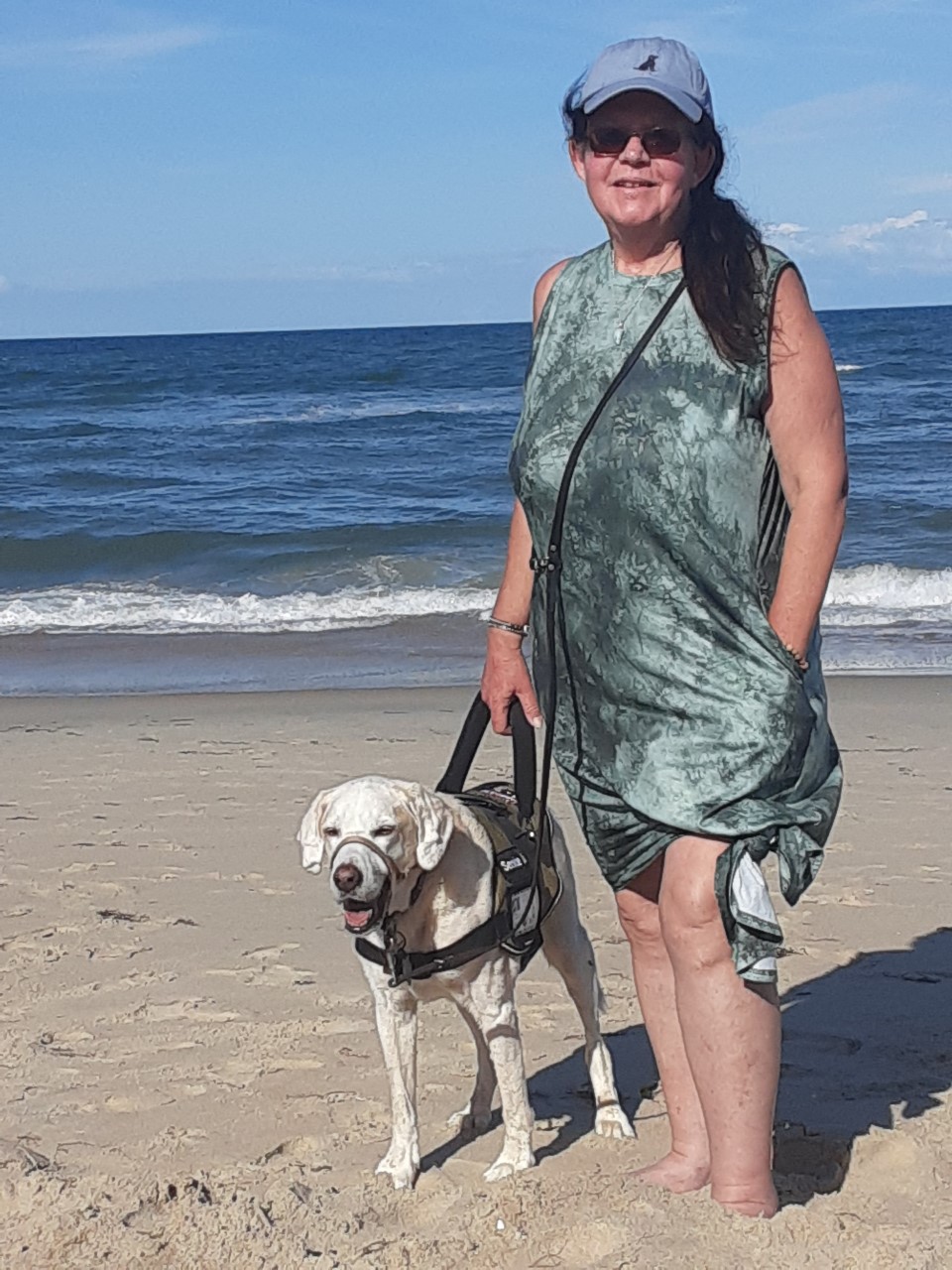
As did Belinda, Leila reached out to other organizations before finding CFS. But CFS is where she felt comfortable and where she came together with Ezra. For Leila and many other service dog recipients, having a dog changes their confidence in how they exist out in the world.
“Ezra is everything to me,” she says. “He gave me my life back — that’s what he did. He’s always there. I isolated myself before I got Ezra because I was scared to go out. I really was. It was unbelievable how much better I felt. I knew that no matter what happened to me, he would sense it, and he would help me.”
But now It’s been more than a decade and Ezra is getting tired.
“He's given everything,” Leila says. “He's given his life to me.” Thankfully, CFS is in it for life, too. As Ezra retires to a life of treats and progressively nicer dog beds, “he's just going to be more spoiled,” Leila says. She has another CFS service dog coming in October. That’s the kind of persistent blessing CFS specializes in. It matters because, as Leila says, “MS will follow me for the rest of my life. I know this. But it gives me courage every day that I’m not alone. I don't have to be scared of anything. Nothing.”
Surprise.
Russell Worth Parker is a retired United States Marine turned writer. He lives in Wilmington, North Carolina, with his wife and daughter. Worth writes for an array of publications including The New York Times, Garden and Gun Magazine, Salvation South, Backcountry Journal, Shooting Sportsman Magazine, Salt Magazine, and websites such as SOFLETE.com, DieLiving.Com, and several commercial and nonprofit websites.

